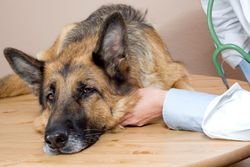
If your once energetic dog has suddenly stopped wanting to move around, they may have developed hip dysplasia. It’s a condition in which the hip socket doesn’t completely cover the ball portion of the upper thighbone. If you think your furry family member has this issue, take them to see a veterinarian soon. In the meantime, take a moment to learn some information about hip dysplasia in dogs.
What Are the Causes?
Hip dysplasia is a hereditary condition that occurs more frequently in larger dog breeds, like German Shepherds, Great Danes, and Labrador Retrievers. Although veterinarians aren’t sure which genes cause the condition, all puppies with the predisposition are born with normal hips; some changes start within a few weeks after their birth.
Factors that increase the risk of developing this condition include poor nutrition, rapid weight gain, and excessive growth rate. If you have a puppy, don’t overfeed them or give them a diet with too much calcium or protein. When a dog becomes obese, it puts a lot of stress on the hips and worsens the joints.
What Are the Symptoms?
Dogs can display hip dysplasia symptoms at any age; check if your furry friend has trouble moving, a decreased range of motion, weakness in one or both hind legs, or a swaying gait. If your dog has been displaying any of these signs, you should notify your veterinarian as soon as possible.
 At the office, the vet will check your dog’s hind legs and hip joints for inflammation, grinding, or pain. After, they’ll take a radiograph or X-ray to determine how severe the problem is. This will help the veterinarian come up with a treatment plan for your dog.
At the office, the vet will check your dog’s hind legs and hip joints for inflammation, grinding, or pain. After, they’ll take a radiograph or X-ray to determine how severe the problem is. This will help the veterinarian come up with a treatment plan for your dog.
What Are Some Treatment Options?
If your dog has been diagnosed with hip dysplasia, your veterinarian may recommend several treatments. If your furry family member, for example, is obese, they may suggest helping him lose weight to take the stress off the hips. Other common treatment options include physical therapy, anti-inflammatory medication, and joint fluid modifiers.
If your dog has severe hip dysplasia, surgery may be necessary to rectify the problem. Although there are a few surgical options available, a total hip replacement is the most effective. During the procedure, a surgeon will replace the hip joint with an implant.
If your dog has developed hip dysplasia, turn to Rolling Hills Veterinary Hospital in Columbia, MO. The veterinary hospital provides a wide variety of services, from routine checkups to pet surgery, and pride themselves in giving each pet the best care available. They also maintain a small shop with many types of pet products, like food, medicine, and dental care products. For the Keene Street location, call (573) 449-3791. For Buttonwood Dr., call (573) 449-7387. Visit them online for their full list of offerings.
About the Business
(5 reviews)
Have a question? Ask the experts!
Send your question

